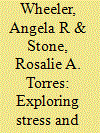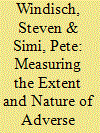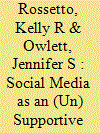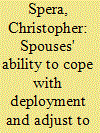|
|
|
Sort Order |
|
|
|
Items / Page
|
|
|
|
|
|
|
| Srl | Item |
| 1 |
ID:
190784


|
|
|
|
|
| Summary/Abstract |
Previous research indicates that one’s identity relates to one’s use of specific coping strategies. Exploring the relationship between self and coping in military wives is crucial to understanding how they manage military lifestyle-related stressors. The researchers hypothesized that identity status, self-concept clarity, self-monitoring, mastery, and role conflict will be related to choice of emotion-focused coping or problem-focused coping strategies. Two hundred two participants completed an anonymous online survey containing standardized scales. Ordinary least squares (OLS) regression analyses revealed that emotion-focused coping had positive relationships with achieved identity status and role conflict. Problem-focused coping had positive relationships with moratorium status, self-concept clarity, self-monitoring, and mastery. Findings provide preliminary support that sense of self is important in understanding how military wives choose to cope with particular challenges.
|
|
|
|
|
|
|
|
|
|
|
|
|
|
|
|
| 2 |
ID:
094817


|
|
|
|
|
| Publication |
2010.
|
| Summary/Abstract |
Studies on active duty military families indicate that deployment disrupts normal functioning of the family. Scholars still, however, lack the necessary knowledge to fully grasp the impact that the current Iraq and Afghanistan wars have had on Army National Guard (ARNG) families who have experienced deployment. A grounded theoretical approach to interviews with ARNG spouses yields insight into how these families are coping with the often-unexpected event of wartime deployment. The authors identify stressors and coping strategies used by these spouses and offer suggestions for future research that will allow scholars to more fully understand the present situation ARNG families are facing.
|
|
|
|
|
|
|
|
|
|
|
|
|
|
|
|
| 3 |
ID:
188074


|
|
|
|
|
| Summary/Abstract |
While progress has been made to understand mid-life correlates associated with extremist participation, much less research focuses on adolescent risk factors. The purpose of the current study is to expand upon the focus on individual-level correlates by assessing the extent and nature of childhood adversity among a sample of former white supremacists. The current study relies on in-depth life-history interviews with ninety-one North America-based former white supremacists and the Adverse Childhood Experiences questionnaire. Overall, the current sample contained elevated rates of childhood risk factors with 63 percent of participants having experienced four or more adverse experiences during the first eighteen years of their lives (as compared to 55 percent of a comparison “high risk” sample and 16 percent of the U.S. general population sample). Furthermore, participants discussed a variety of maladaptive coping strategies associated with adversity that generated vulnerabilities to adolescent misconduct and extremism early in the life-course. Our findings indicate that extremist onset does not begin with a single life event but rather is generated, and further exacerbated by the cumulative impact of multiple adverse experiences during childhood.
|
|
|
|
|
|
|
|
|
|
|
|
|
|
|
|
| 4 |
ID:
093615


|
|
|
|
|
| Publication |
2010.
|
| Summary/Abstract |
In the backdrop of the popularization of social capital, it has become fashionable in development circles to highlight the resilience of the poor in the midst of stresses and shocks as well as their resourcefulness. Expressing scepticism, this article argues that social capital is a 'conditional' resource for the poor, availability of which is dependent on the presence of a 'critical mass' of other resources. The State plays a pivotal role in creating this 'critical mass'. Household level case studies from a village in Kerala, India, on how the poor cope with vulnerable situations, are used to illustrate this point.
|
|
|
|
|
|
|
|
|
|
|
|
|
|
|
|
| 5 |
ID:
185257


|
|
|
|
|
| Summary/Abstract |
The current study explored how romantic partners of active-duty service members perceived social media as (un)supportive when dealing with military lifestyle challenges. This study also explored coping and support paradoxes as they play out when military partners are using social media to help them cope. Twenty-four partners (female, n = 22; male, n = 2) participated in interviews. Participants reported mostly using Facebook (e.g., spouse groups) for dealing with military lifestyle challenges. Supportive functions included seeking and providing support and relational maintenance and development. Unsupportive functions included reinforced boundaries and support breakdowns. Findings are discussed with a focus on communal coping and coping and support paradoxes.
|
|
|
|
|
|
|
|
|
|
|
|
|
|
|
|
| 6 |
ID:
085368


|
|
|
|
|
| Publication |
2009.
|
| Summary/Abstract |
Using data from 34,381 Air Force active-duty members, the current study examines active-duty members' perceptions of their spouse's or significant other's ability to cope with deployment of unknown length and adjust to demands of being an Air Force family. Active-duty members' perception of their spouse's ability to cope with deployment significantly varied by rank and time married, with 35 percent of junior enlisted and 30 percent of members married less than three years indicating their spouse would have a serious or very serious problem coping with deployment of unknown length. Protective factors-unit relationship quality, leadership effectiveness, and tangible social support from community members-were positively and significantly related to members' reports of spousal ability to adjust to Air Force family demands. The variance explained by these protective factors was highest for active-duty members who had been away from home for deployment or temporary duty for more than six months in the past twelve months.
|
|
|
|
|
|
|
|
|
|
|
|
|
|
|
|
| 7 |
ID:
111901


|
|
|
|
|
| Publication |
2012.
|
| Summary/Abstract |
This article presents two coping paths available to Palestinian women in Israel today - turning to a traditional healer in the community, an act that represents turning 'inwards', and pursuing higher education, an act that represents turning 'outwards'. These two paths enable coping - particularly in times of societal transition - and provide opportunities for the women who utilize them. On the other hand, each of these paths is laden with unique challenges and the women who take them must often pay a price. Despite the differences between them, the article reflects the similar ramifications of these coping paths on the women's lives.
|
|
|
|
|
|
|
|
|
|
|
|
|
|
|
|
|
|
|
|
|